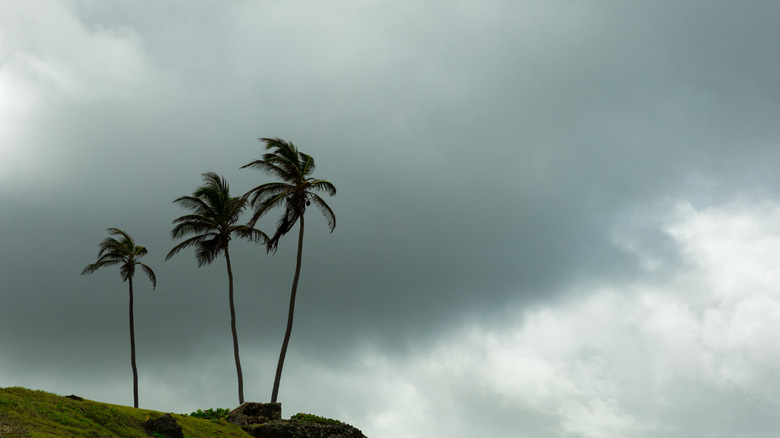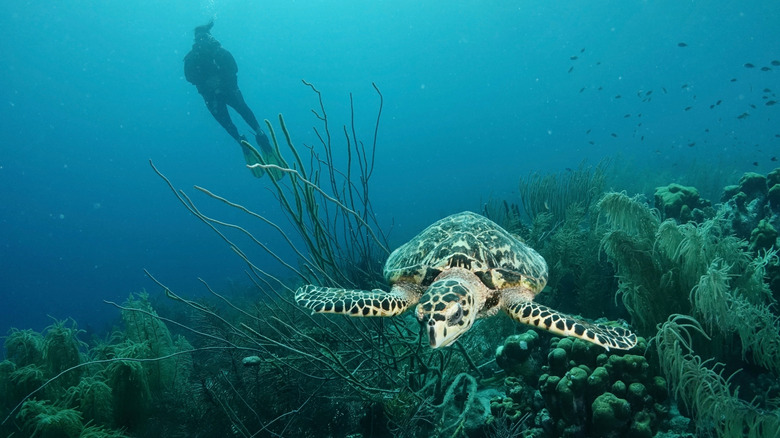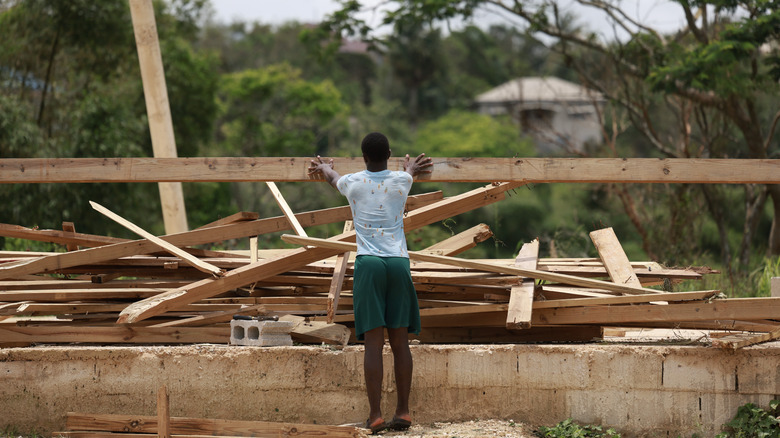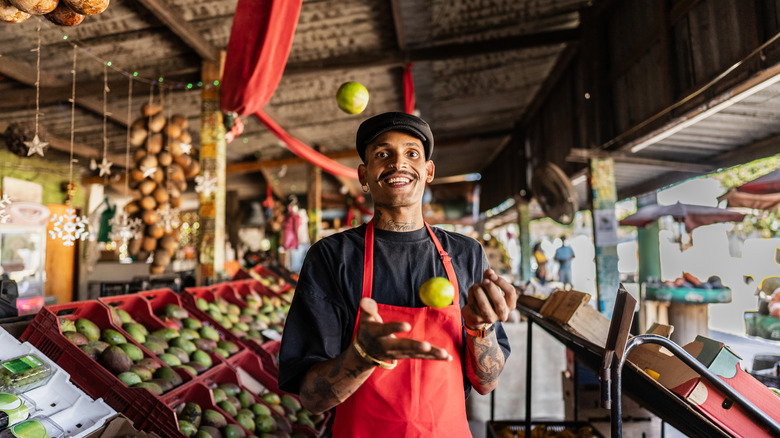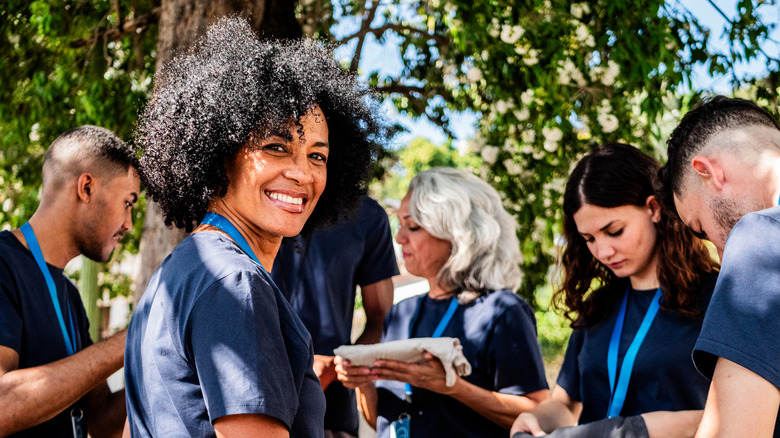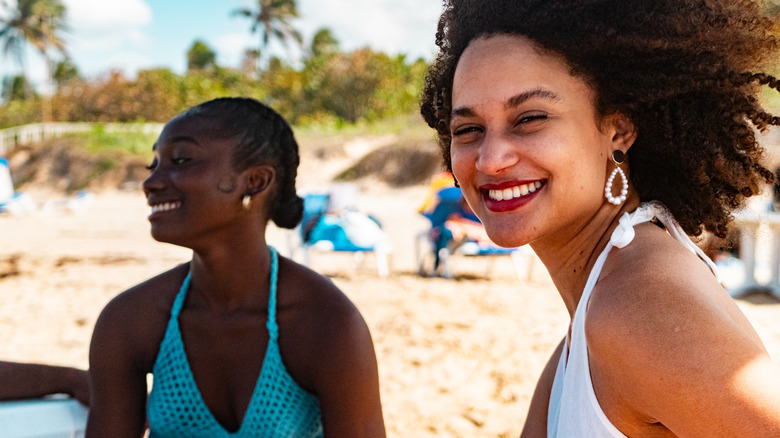Crucial Dos & Don'ts For Visiting The Caribbean After A Hurricane, According To An Expert
Just a few weeks ago, Category 5 Hurricane Melissa tore through the Caribbean, leaving meteorologists stunned by its sheer force. The storm actually "maxed out" automated satellite estimates of strength. In addition, the hurricane caused catastrophic damage across much of Jamaica and brought destruction to Cuba, Haiti, the Dominican Republic, Turks and Caicos, the Bahamas, and Bermuda.
With many communities left suffering after flooding and the destruction of crops — plus some neighborhoods nearly flattened — local governments are racing to rebuild and restore basic infrastructure before the next wave of storms. December marks the peak of tourism season for these islands, and with much of the Caribbean depending on the travel industry as a huge source of income (travel makes up nearly 30% of Jamaica's GDP), a drop in visitors this winter could deal another devastating blow to already struggling economies.
So, should you cancel your Caribbean vacation? And how can you support recovery efforts while still traveling responsibly? Explore spoke exclusively with travel expert Victoria Fricke, owner of the luxury travel agency Vic's Vacations, to bring you a list of dos and don'ts — so you can help these islands rebuild and maybe also experience some of the unique things you can only do in the Caribbean.
Don't cancel your trip if it's safe
While planning a coastal vacation right after a devastating storm may feel inconsiderate, in regions that depend heavily on tourism, keeping your trip can sometimes be one of the best ways to help. A look at official government websites can also give you an overview of local recovery efforts and whether officials are encouraging travelers to return or advising them to wait until later in the season.
In Jamaica, hotel housekeeper Patricia Mighten shared with Euronews the human toll: "With some of the hotels closed and most of the tourists gone, many of us are left without work. This storm didn't just destroy buildings; it shattered jobs and incomes for many of us and our families." If the region is ready to welcome visitors and you feel safe doing so, your trip can make a meaningful difference — keeping local businesses open, workers employed, and communities moving forward. However, also remember to remain considerate, expert Victoria Fricke adds, "To realize it's not all about you."
Don't expect the same trip you'd planned
Even if a destination has reopened to travelers, that doesn't mean everything will be back to normal. "The harsh reality of tourism is that, yes, you're paying for an experience, but people and places can only give what they can give," Fricke explains. In other words, go with flexible expectations. Service may be slower, some businesses might still be short-staffed, and supply chain issues could mean the food or amenities you were hoping for aren't available yet.
Still, choosing to visit a country in recovery — when it's safe and appropriate — can be an eye-opening and meaningful experience. You'll likely see more of a place's spirit, and understand its history and challenges in a way you might not on a normal beach vacation. With climate change driving stronger and more frequent disasters — from wildfires to hurricanes — Hurricane Melissa won't be the last to test the Caribbean.
By talking with locals and learning about the storm's lasting effects, travelers can become part of a broader network of awareness and support —whether that means donating to relief organizations, urging policymakers to prioritize climate resilience, or simply sharing these stories with others.
Do support local recovery
Beyond keeping your travel plans when it's safe to do so, there are plenty of other ways to support Caribbean communities recovering from a hurricane. As Fricke puts it candidly, "Money is the key initial thing destinations need." Donating to a trusted organization is often the most effective way to help — even if it doesn't feel particularly hands-on. You can give directly through Jamaica's relief website, for instance.
Before donating, take time to research where your money goes to make sure it's reaching the right people. The U.S. Department of State warns that with the rise of AI, fake charity sites can appear surprisingly professional, so if in doubt, stick with large, established organizations like UNICEF. Officials also advise against sending physical goods such as clothing or canned food. Many countries simply don't have the resources to store or distribute these items, and in some cases, they may already have more than they can handle.
If traveling isn't possible, there are still meaningful ways to help. You can often pre-book future trips with independent hotels, buy gift cards, or shop online for locally made items like jewelry, soaps, or crafts. Every purchase — big or small — helps communities rebuild and keeps their economies moving forward.
Do consider smart Voluntourism
If you want to help on your trip, there are a few things you can do. Voluntourism — traveling somewhere with the goal of volunteering — can be valuable, but only when done thoughtfully and with the right skills. If you have specialized expertise that could genuinely help, reach out to your hotel or travel agency to see if they're aware of opportunities. The U.S. Department of State notes that "overseas disaster relief opportunities for untrained volunteers are extremely limited," and that volunteering after a major storm generally only makes sense for those with extensive experience in medicine, logistics, or engineering.
Well-intentioned volunteer efforts can sometimes do more harm than good — displacing local workers, disrupting children's lives, or reinforcing harmful stereotypes about developing communities. If you do have professional experience and want to help, reach out directly to verified organizations, such as Jamaica's official relief website, to see where your skills might be most needed.
Do stay informed and travel consciously
Before setting off, make sure you're protected — both physically and financially. Fricke recommends always buying travel insurance: "Travel insurance is always less of a financial investment than the coverage it provides." One trip to the hospital will likely make up for all the times you've paid for travel insurance. For anyone planning a future trip — whether to the Caribbean or elsewhere — it's best to purchase travel insurance before a storm is named or forecasted. Once an event has been officially announced, most insurers will no longer cover damages or cancellations related to it, leaving travelers to absorb those costs themselves.
If you're visiting a region prone to natural disasters, stay informed by checking the U.S. Department of State's website for regular safety updates. Many countries also offer free text message alert systems that warn both locals and travelers about potential hazards and how to stay safe. For example, the U.S. Embassy in Cuba recently created a WhatsApp channel for travelers and expats in Cuba to receive any necessary safety updates. Paying close attention to weather forecasts and following local safety guidelines is also pragmatic when planning a road trip during hurricane season — it's the best way to travel responsibly while keeping yourself and others out of harm's way.
